In the same way that a GP refers a patient for Specialist treatment, so your vet can refer your pet to us. Our team includes internationally recognised Specialists in cardiology, orthopaedics, neurology, ophthalmology, oncology, surgery, internal medicine, anaesthesia and radiology. All have completed many years’ additional study in their chosen fields and some are world-class experts.
Your consultation
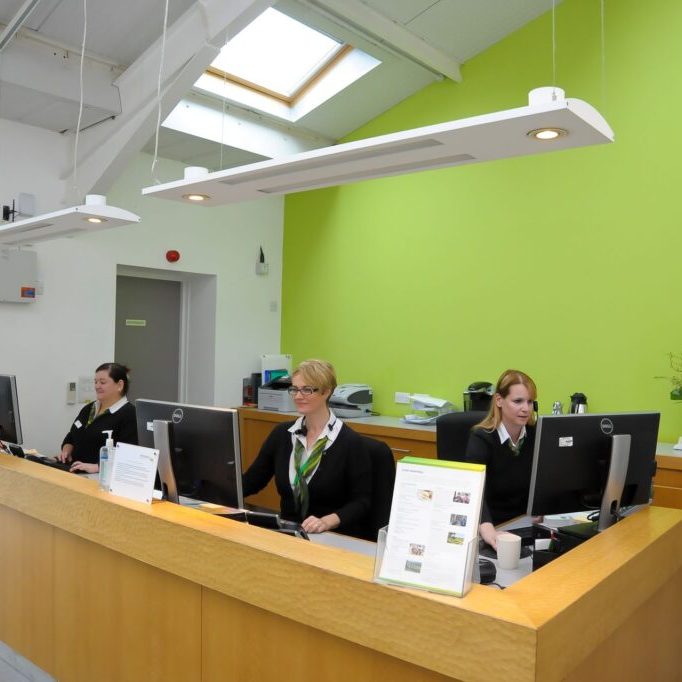
Before the appointment
Most pets need to fast before their consultation appointment. This means food should be withheld from midnight, although water can be given as normal. Pets under 12 weeks of age and diabetic pets should not be fasted, and diabetics should receive their insulin as normal.
On arrival, please park and follow the signs to reception. Disabled parking is available and if you have any special requirements or require help accessing the hospital, please let us know in advance.
You should aim to arrive ten minutes before your appointment. Our reception team will check you in and make sure you and your pet are comfortable.
During the consultation
The Specialist will ask lots of questions about your pet’s health and condition during your consultation. It may feel that they’re repeating what’s already in the medical notes, but it’s really helpful to hear things straight from you.
He or she will talk to you about possible treatment options or diagnostic tests for your pet, including an estimate of costs, and together you’ll decide how to proceed.
We know this can be a difficult and emotional time, and that some of the language we use might be unfamiliar, so please ask as many questions as you need in order to make your decision.
Some owners like to make a list of queries or concerns beforehand, which they can ask in the consultation.
We will communicate regularly with you while your pet is in the hospital, advising on estimated costs and if additional procedures result in costs being exceeded.
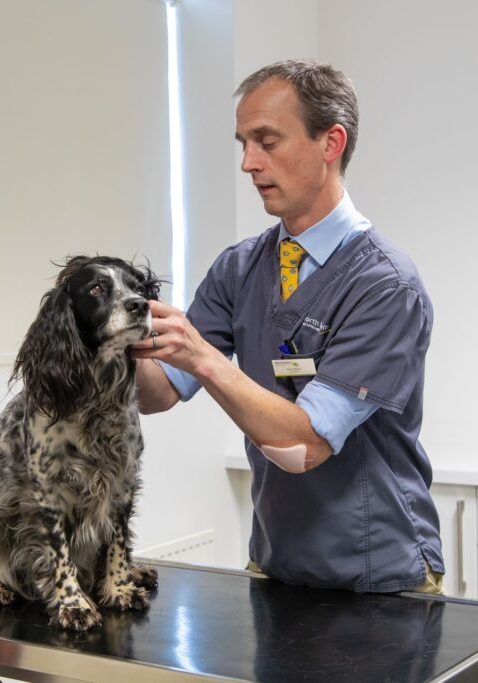
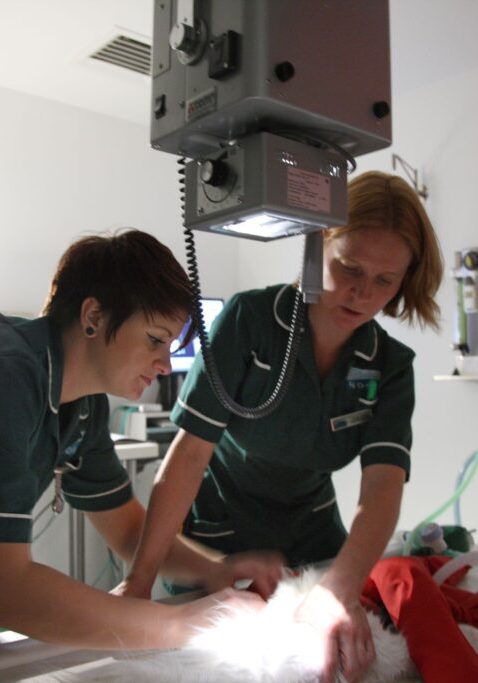
Admission
The majority of patients are admitted for a day or overnight when undergoing diagnostic tests or surgical procedures. More serious conditions may require a longer stay. Your clinician will advise you when to come back and pick up your pet.
Once your treatment plan is agreed, your pet will be taken to the wards to meet the nursing team and be settled into their kennel.
We have separate cat, dog, isolation and high dependency wards, all with natural light and air conditioning. All kennels have special vet beds and blankets. Unfortunately, we cannot accept your pet’s own bedding and toys for risk of infection.
Our nurses work in teams and are assigned to particular specialisms for a week at a time. This ensures your pet has the same team of nurses looking after them for the duration of their stay. All new admissions are given a check by their nurse before settling down to wait for their procedure.
Our nursing assistants feed all the patients, as advised by the clinicians, and keep patients clean and well groomed, with plenty of cuddles and TLC!
Diagnostics
Our Imaging Suite has the facilities to conduct MRI scans, CT scans, ultrasound scans, endoscopy and x-rays, and is staffed by qualified radiographers. Most patients are sedated or anaesthetised prior to their procedure. Afterwards, they recover in the wards under the constant supervision of our nursing team. Preliminary results of imaging studies are available immediately.
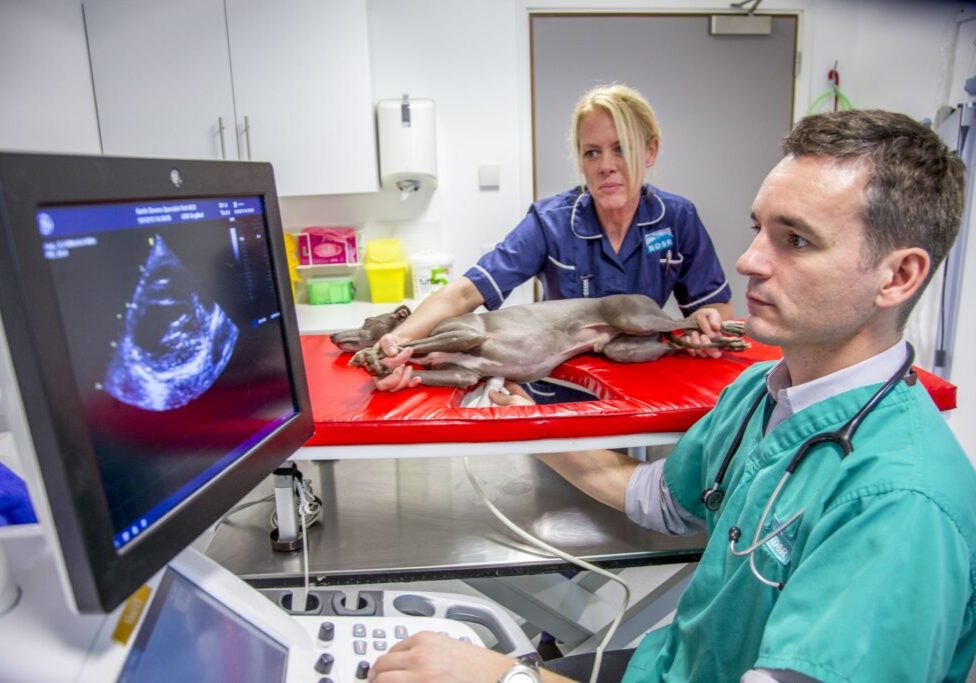
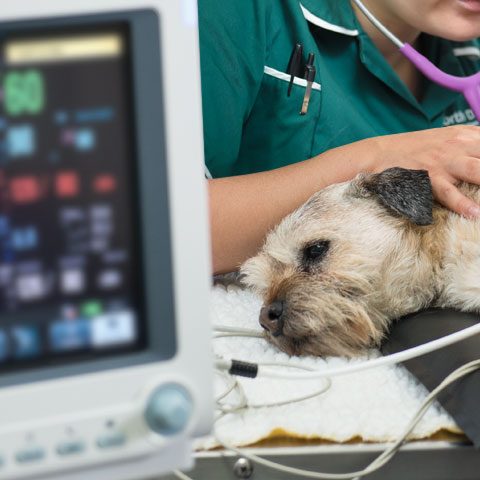
Anaesthesia
Surgical and some diagnostic procedures require general anaesthesia. Our team of internationally recognised anaesthesia Specialists oversee all anaesthesia in the hospital.
Anaesthetic plans are individualised to patient needs, and extensive ‘multi-parameter’ monitoring is employed as standard, just as in a human ICU. We continually strive to optimise pain prevention and pain relief in all our procedures, helping patients to recover quickly from anaesthesia and surgery.
Operations
We perform a range of operations, from cataract surgery to brain tumour removal, in our suite of four operating theatres. Our theatre team includes Specialists in orthopaedic surgery, soft tissue surgery (including cancer surgery), neurosurgery, ophthalmic surgery and even cardiology, along with Specialist anaesthetists, theatre nurses and nursing assistants.
Before surgery, the patient is assessed and an individual anaesthetic and pain management plan created. During surgery and recovery, the patient is monitored constantly, and reassessed according to the Specialist’s recommendations. Patients recover on the wards, where they are regularly checked. Individualised nursing care plans ensure a happy and speedy recovery.
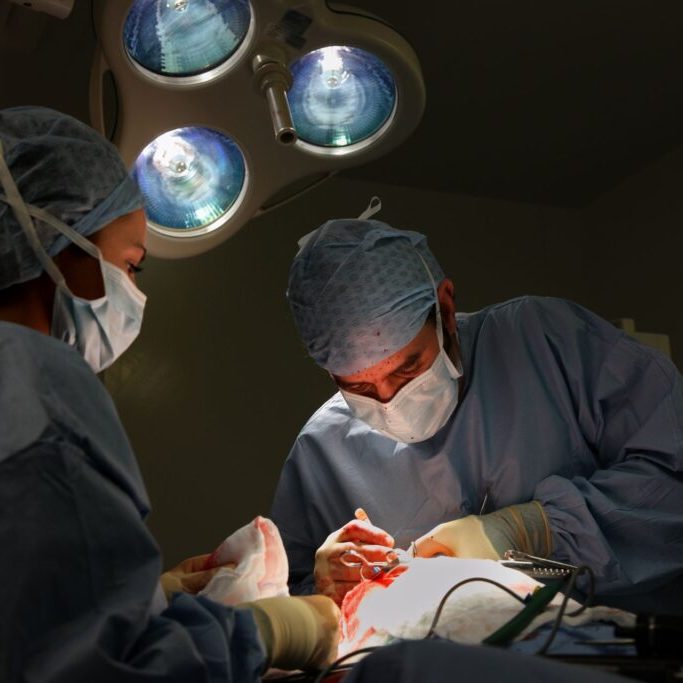
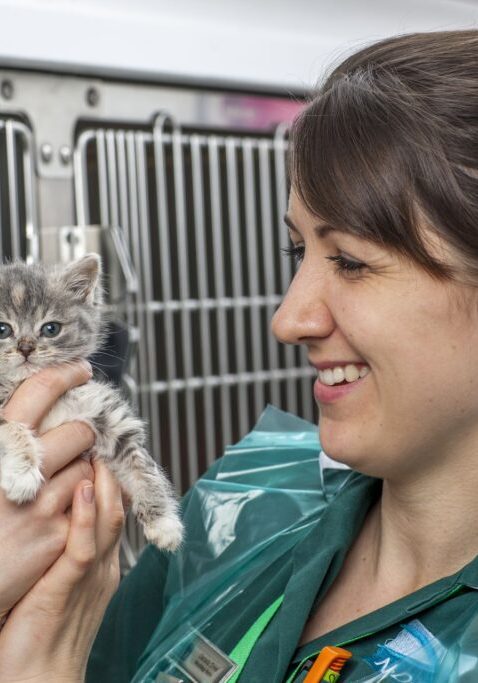
On the wards
Our ward nurses represent the largest team in the hospital. Ward nurses monitor patients, prepare patients for procedures, administer medication as directed by Specialists and ensure all necessary checks are carried out, as well as other requirements such as physiotherapy.
Nurses are allocated to specific disciplines and work together to ensure continuity of care for patients, with thorough handovers between early and late teams ensuring nurses know the patients well.
Patients who are very poorly are kept in the High Dependency Unit (HDU) under constant supervision. HDU is equipped with incubators, extra-large kennels to allow nurses to sit in with patients and even a crash trolley, just in case.
Our cat ward is quiet and calm, designed so that cats cannot see one another from the kennels, in order to minimise stress.
Feeding and special diets
During their hospital stay, patients are fed high-quality, digestible foods. Every day, fresh chicken and white fish are cooked for those that need a little extra encouragement to eat, and we also prepare foods for patients we know will try something else. We avoid foods that are known to confer risk of tummy upset and we understand that some pets have known food intolerances. If your pet has a specific dietary need, please consider bringing some of their food with you to ensure we can maintain their dietary routine.
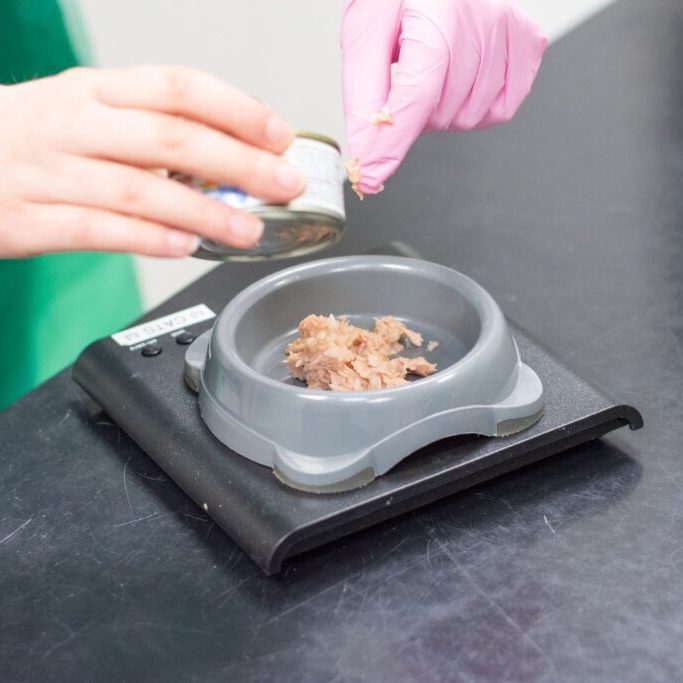
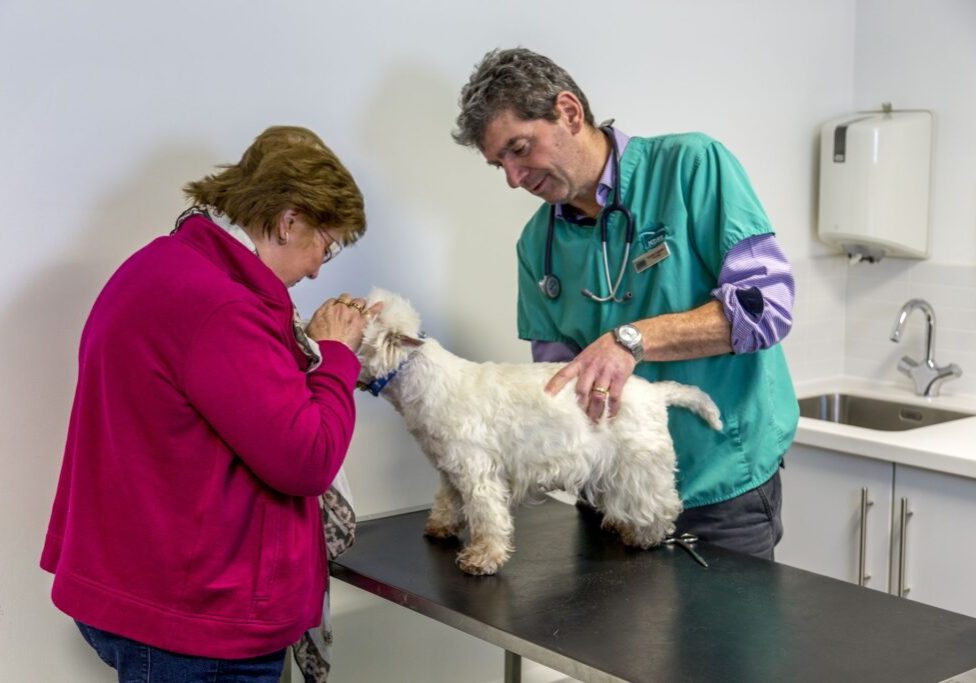
Visiting your pet
If you wish, you can visit your pet during their stay. To keep the hospital running smoothly, visits take place within specified times and there may be occasions when we feel it is better not to visit a patient.
Discharge appointment
When your pet is ready to go home, a discharge appointment will be made. During this appointment, your Specialist or one of the nurses looking after your pet will meet with you and explain any homecare instructions. This will cover issues such as exercise, pain management and things to look out for. We will explain strategies to help your pet’s recovery, such as physiotherapy or wound care, and advise if you need to come back for a re-check. Please ask us if you have any concerns or if anything is unclear.
If you are covering costs through an insurance policy, we will be happy to help you with your claim. Please see the insurance information on our website for further details. After your pet is discharged, a letter outlining all diagnoses, treatments and further plans will be sent to your vet.
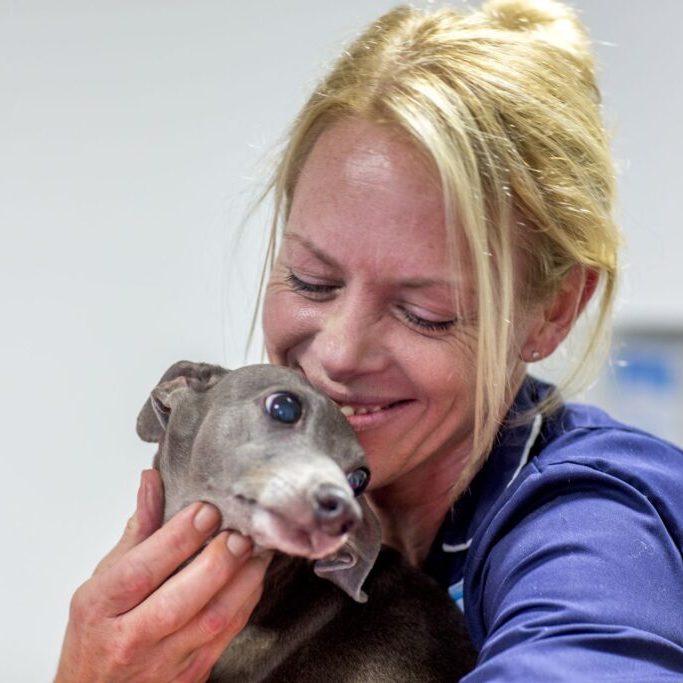
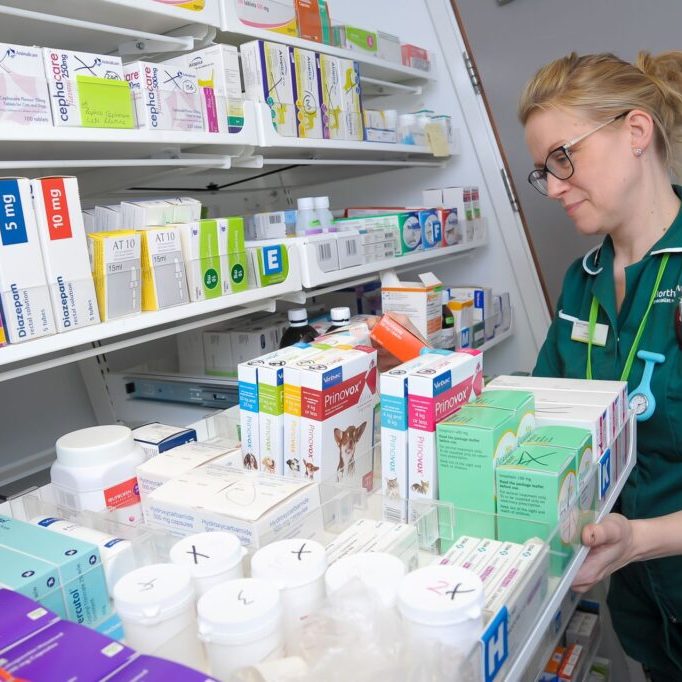
Prescriptions
We dispense medications at the time of discharge. If you prefer, you can ask us for a prescription so you can obtain your pet’s medications elsewhere (a small charge will be made for this). We can only provide prescriptions for animals under our care, so any patient requiring repeat prescriptions will need to be re-assessed by us at least every 6 months.
Once your pet has been discharged, if you have concerns about any aspect of their recovery or behaviour, please call us. Vets and nurses are on the premises 24/7 and will be happy to help. We will aim to put your mind at rest, provide advice or if necessary, re-admit your pet to the hospital.
Feedback
We are confident that we can offer your pet the best clinical care available. We put heart and soul into caring for our patients and always value feedback.
It means the world to us to know that our care is valued, so please feel free to send an email or a card if you are happy with the care your pet has received. Likewise, if you don’t feel we have done our best, please let us know and give us the chance to put things right. We can only improve things if we know where we have gone wrong, so appreciate you contacting us with any concerns, however small.
After a procedure all clients will be sent a short satisfaction survey via SMS or email. We are passionate about delivering outstanding quality care and will use your feedback to improve our service. You can also tell us about your experience by emailing us at: [email protected] or giving us a call on: 01883 741440.
Arranging a referral for your pet
If you would like to refer your pet to see one of our Specialists please visit our Arranging a Referral page.